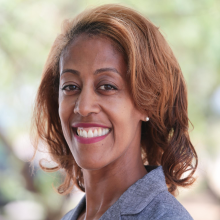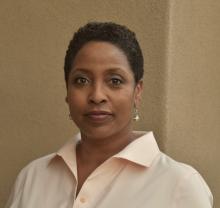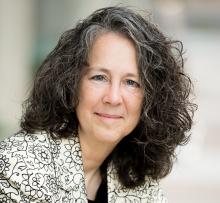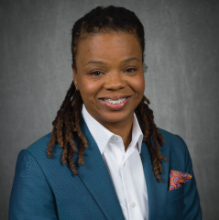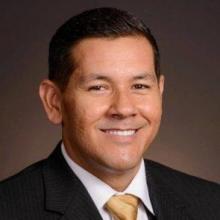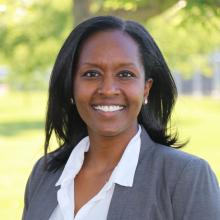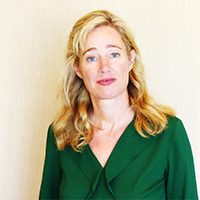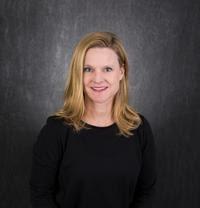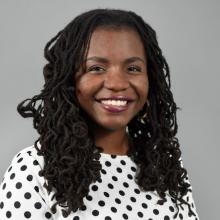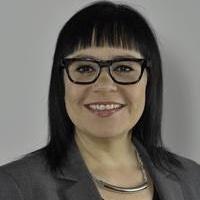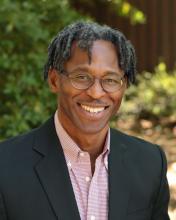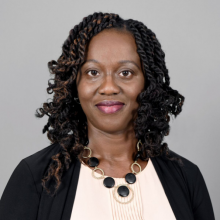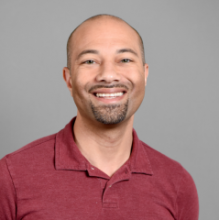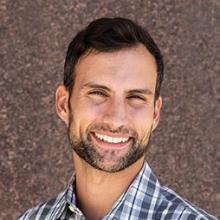Assistant Professor, MLF Teachers College
Arizona State University
Tara Nkrumah is an assistant professor in the division of teacher preparation at Mary Lou Fulton Teachers College. Her research on equitable teaching practices for anti-oppressive discourse in education and science, technology, engineering, and mathematics (STEM) uses the theatre of the oppressed to explore culturally relevant/responsive leadership and pedagogy.
Nkrumah joined ASU in 2019 as a postdoctoral research associate at the Center for Gender Equity in Science and Technology where she conducted culturally relevant and responsive professional development for the flagship CompuGirls programs focused on transforming the STEM education culture to be inclusive of underrepresented groups, in general, and girls and women of color, in particular. Nkrumah has extensive teaching experience in the United States where in 2018 she was awarded the Diversity Educator of the Year at the eighth-largest school district in the nation at that time. From 2007 to 2014, she engaged with culturally and linguistically diverse learners in Ghana, West Africa.
Nkrumah's educational background includes a Ph.D. in Educational Leadership and Policy Studies from the University of South Florida, as well as an M.ED. in Curriculum and Instruction from Tennessee State University and a B.S. in Environmental Science from Middle Tennessee State University.
Center Director & Foundation Professor
Arizona State University
Dr. Lois Brown is the director of the Center for the Study of Race and Democracy and Foundation Professor of English at Arizona State University. She is a public historian and a scholar of African American literature and culture whose groundbreaking research reshapes our understanding of race, class, gender, education, faith, and place in America. Her published works include Black Daughter of the Revolution: A Literary Biography of Pauline Elizabeth Hopkins, the first modern edition of Memoir of James Jackson, The Attentive and Obedient Scholar which is the earliest known biography of a free child of color in the North, and Encyclopedia of the Literary Harlem Renaissance. She was featured on the acclaimed PBS documentary The Abolitionists and has curated and collaborated on exhibitions for major American museums and libraries. Brown is an award-winning teacher whose courses focus on early African American literary history, African American and American women writers, enslavement and the literary imagination, environmental humanities, and film.
Assistant Director for Diversity and Leadership
Center for Bio-mediated and Bio-inspired Geotechnics
Arizona State University, College of Integrative Sciences and Arts
Jennifer L. S. Chandler holds a Ph.D. in Leadership and is a Senior Lecturer in the Leadership and Integrative Studies in the College of Integrative Sciences and Arts. She also serves as the Assistant Director for Diversity and Leadership for the Center for Bio-mediated and Bio-inspired Geotechnics (CBBG), a National Sciences Foundation funded Engineering Research Center where she created and leads the mentorship preparation efforts for engineering graduate students as well as contributing to diversity, equity, and culture of inclusion workshops. Dr. Chandler is also an Affiliate Faculty for the ASU Center for the Study of Race and Democracy (CSRD). Her research employs a critical perspective examining organizational leadership processes that reveal embedded systemic oppressive practices. She has published her model, Examining Dominant Social Norms, and has created and led workshops training people to use the model at international conferences as well as for ASU faculty, staff, and students. She integrates a critical analysis perspective to reveal and disrupt oppressive organizational leadership practices that maintain social inequities into the courses she designs and teaches. Her publications include articles and book chapters and the following books - Critical Leadership Theory: Integrating Transdisciplinary Perspectives and Colluding, Colliding, and Contending with Norms of Whiteness.
Assistant Professor
Arizona State University, Polytechnic
Brooke Coley is an assistant professor in engineering at the Polytechnic School of the Ira A. Fulton Schools of Engineering at Arizona State University. Prior to joining the Polytechnic School, Coley completed postdoctoral training at ASU in engineering education. Coley also served as the associate director for the Center for Diversity in Engineering at the University of Virginia and as an American Association for the Advancement of Science (AAAS) Science and Technology Policy Fellow, where she worked at the National Science Foundation (NSF) for several years.
Coley is a bioengineer and social justice scholar. In her work, she hopes to push the bounds of traditionally heteronormative engineering environments through transdisciplinary approaches. Intrigued by the intersections of engineering education, mental health, and social justice, Coley's primary research interest focuses on virtual reality as a tool for developing empathetic and inclusive mindsets. She is also interested in the lived experience of hidden populations in engineering education and innovations for more inclusive pedagogies. Coley also co-leads two NSF-funded studies addressing diversity in university-affiliated makerspaces and the impact on the identity formation of underrepresented undergraduate engineering students, and, most recently, exploring the untapped potential of community college undergraduate engineering students and the factors impacting their decision making pathways.
Coley is an advocate for inclusion in all levels of her work - research, teaching and service. She has a commitment to global connectivity and awareness and recently co-facilitated the workshop, "Inclusive Maker Pedagogies and the Power of Story for Innovative Engineering Education," at the Higher Engineering Education Alliance 2017 Conference in Can Tho, Vietnam. This past summer, Coley was also honored as an Apprentice Faculty Grant Recipient by the Educational Research Methods Division of the American Society for Engineering Education for her commitment to innovation in teaching and potential to make substantial contributions to engineering education. Next spring, Coley will introduce a new graduate-level course addressing the persistent inequities in STEM, with a focus on engineering. She is a strong supporter of student organizations and is a voluntary mentor for the newly formed Poly chapter of the National Society of Black Engineers.
Founder and Managing Member
College Readiness Coach, LLC
Dr. Gabriel Escontrías, Jr., is the Founder & Managing Member of College Readiness Coach, LLC. In addition, he is a Faculty Associate in the Mary Lou Fulton Teachers College at Arizona State University and an Adjunct Lecturer in the Mel & Enid Zuckerman College of Public Health at the University of Arizona. He has served in various academic, student affairs, and research professional capacities within higher education over the last fifteen years. Most recently he served at ASU as the Manager of the Center for Gender Equity in Science and Technology. He is committed to ensuring equity, access to higher education, and student success. Serving our community is key in his life and therefore he is currently the Vice President of A Stepping Stone Foundation, Development Chair for the ASU Chicano/Latino Faculty & Staff Association, member of AARP’s AZ Hispanic Connection, a member of the Association of Fundraising Professionals, a member of the Phoenix Association of REALTORS®, and a Group Exercise Instructor at the Lincoln Family Downtown Phoenix YMCA. Nationally he is a member of the American Educational Research Association and the Association for the Study of Higher Education. His service has been recognized as he was awarded the MLK Diversity Award in Education by the Tempe Human Relations Commission (2014), selected as one of 40 Hispanic Leaders Under 40 in Arizona (2013), and awarded the 2013 Excellence in Diversity Award (classified staff/service professional/administrator category) from the Committee for Campus Inclusion at ASU. Dr. Escontrías is an alumnus of Arizona State University (ASU) having received his Ed.D. (2012) and M.Ed. (2006) in the Higher and Postsecondary Education Program in the Mary Lou Fulton Teachers College and his B.A. (2003) in the Sociology Program in the College of Liberal Arts and Sciences.
Assistant Professor, Higher & Postsecondary Education, MLFTC Division of Educational Leadership and Innovation
Arizona State University
Dr. Meseret F. Hailu is an Assistant Professor of Higher and Postsecondary Education at Arizona State University. Her research focuses on the retention of minoritized women in STEM higher education pathways. Recently, her work has focused on 1) how Black immigrant women in the U.S. persist in engineering, and 2) how higher education institutions in Eastern Africa conceptualize and implement equity initiatives. Prior to coming to ASU, Dr. Hailu was a Postdoctoral Research Associate at The Ohio State University. Dr. Hailu's research has been funded by FHI 360, the Fulbright Program, and the National Science Foundation. Visit meserethailu.com for more information.
Chief Executive Officer
Embodied Games
Dr. Johnson-Glenberg holds a Ph.D. in Cognitive Psychology from the University of Colorado at Boulder. She creates embodied games that specialize in teaching STEM (Science, Technology Engineering and Math) and Health Sciences. Her current research focuses on designing games for behavioral and cognitive change. She has also designed several NLP algorithms for use in her games. One innovation that sets her lab’s games apart is that motion-capture technologies are used while learners gesture during play. She serves as the Director of the Embodied Games for Learning lab (EGL) located at the Learning Sciences Institute at Arizona State University. In addition, she is the CEO/co-Founder of a spin-out company called Embodied Games, LLC. This new company will serve as the portal for her commercialized games. She has been the Principle Investigator on multiple federal grants from the Department of Education (IES), the National Institutes of Health (NICHD) and the National Science Foundation (EHR- DRK-12). In addition, she has run several grants from private foundations including the fragile X Foundation - where she created a neural network of memory function individuals with fragile X syndrome. A recent Gates Foundation/NGLC grant was just completed where she helped to create several games to teach middle school children about Simple Machines. She has published widely on cognition, embodied learning in new media, and neural networks. Her most recent game is an award-winnning exer-game using the Kinect sensor to teach children about nutrition and MyPlate called The Alien Health Game. You can read a peer-reviewed article on Alien Health Game by clicking here.
Education Coordinator
Center for Bio-mediated and Bio-inspired Geotechnics (CBBG)
Arizona State University
Jean Larson has a Ph.D. in Educational Technology, postgraduate training in Computer Systems Engineering, and many years of experience teaching and developing curriculum in various learning environments. She has taught technology integration and teacher training to undergraduate and graduate students at Arizona State University, students at the K-12 level locally and abroad, and various workshops and modules in business and industry. Dr. Larson is experienced in the application of instructional design, delivery, evaluation, and specializes in eLearning technologies for training and development. Her research interests focus on efficient and effective online learning, and how instructors are prepared to teach in digital environments. She coordinates outreach events for the Center for Bio-mediated and Bio-inspired Geotechnics (CBBG) with local school districts and organizations, various centers on the ASU campus, and summer programs for teachers, high school students and undergraduates. She also develops CBBG curriculum for learners at the K-12, college, and professional development levels.
Founder and Director of ASEI
Dr. Dalya Lateef is the founder and director of ASEI. She holds her Ph.D. in Integrative Biosciences from Tuskegee University and completed five years of postdoctoral training in biomedical research at the National Institutes of Health in Bethesda, Maryland. Dr. Lateef has extensive experience teaching at both the graduate, college, and high school levels. She is currently a lecturing professor at Arizona State University and teaches several labs and classes offered by the Arizona Science and Engineering Institute.
Director, American Indian Policy Institute, Arizona State University
Morris has a diverse professional background, which includes academia; university teaching; book, article, and white paper researcher and author; and is a nationally acclaimed speaker. She has worked with Native American tribes; Tribal businesses; Native American non-profits; Native media makers, artists, and galleries; written a college accredited curriculum in Native American new media; and has advocated for digital inclusion at the Federal Communications Commission and on Capitol Hill. A member of the Chickasaw Nation of Oklahoma, Morris maintains a strong working relationship with her community, and her passion for art, media, policy, and advocacy emerged from these strong ties and her own tribal roots. Her book, Native American Voices: A Reader, continues to be a primary teaching tool in colleges throughout the country. Morris’s research and publications on Native American media and the digital divide is focused on Internet use, digital inclusion, network neutrality, digital and new media curriculums, digital inclusion, and development of broadband networks in Indian Country. As an entrepreneur prior to her ASU appointment, Morris founded Homahota Consulting LLC a national Native American woman-owned professional services firm working in policy analysis, telecommunications, education, and research assisting tribes in their nation-building efforts and working with Native Nations, tribal businesses, and those businesses working with tribes.
School Director and Professor, School of Mathmatical and Natural Sciences, ASU
Previously, Dr. Morris was a Professor in the Department of Chemistry and Director of the Atmospheric Sciences Program at Howard University. He was the Principal Investigator and Founding Director of the NOAA Cooperative Science Center in Atmospheric Sciences and Meteorology (NCAS-M). This multidisciplinary research and education organization is a thirteen-member academic research consortium that NCAS-M partners with NOAA’s National Weather Service (NWS), the National Satellite and Environmental Data Service (NESDIS), and Oceanic and Atmospheric Research (OAR) to advance scientific knowledge about the world’s atmosphere and societal responses to weather, climate, and air quality phenomena.
Dr. Morris also founded the HU Graduate Program in Atmospheric Sciences (HUPAS). HUPAS is the first PhD-degree granting Atmospheric Sciences program at any minority-serving institution and is a national leader in the production of minority PhDs in its field. Under his guidance, over 50% of the African American and 30% of the Hispanic American PhDs in Atmospheric Sciences produced from 2006 to 2018 in the United States graduated from this program. 97% of the program’s alumni are working in their respective fields across federal agencies, the private sector, and academia.
Dr. Morris’ research focuses on the chemical evolution of atmospheric particulate during transport and residence times in the lower troposphere and the implications to aerobiology, climate, and cloud processes.
Assistant Professor
College of Health Solutions, Arizona State University
Ojinnaka is an assistant professor of biomedical informatics. Her research focuses on identifying the associations between individual and population-level social determinants of health, and disparities in health outcomes and health care utilization. Her research leverages databases such as cancer registry and public-assistance program data, to identify factors that affect health outcomes and disparities. Her research also involves implementing and evaluating interventions aimed at improving healthcare access and reducing health disparities.
Rod Roscoe is an associate professor of human systems engineering in the Polytechnic School of the Ira A. Fulton Schools of Engineering, and a Diane and Gary Tooker Professor of Effective Education in STEM. He is the affiliate faculty of the Mary Lou Fulton Teachers College and a member of the Center for Human, Artificial Intelligence, and Robot Teaming (CHART). His research investigates how the intersection of learning science, computer science, and user science can inform effective and innovative uses of educational technologies. He is also interested in how cognitive, metacognitive, and motivational learning processes can be scaffolded by educational technology. Recent work has explored engineering education with a focus on human systems engineering and applied psychology. He is passionate about issues of inclusion and equity, and recently co-edited a volume on Advancing Diversity, Inclusion, and Social Justice through Human Systems Engineering (CRC Press). He serves on ASU Committee for Campus Inclusion (Polytechnic Campus co-chair), Chair of the HFES Societal Impact Committee, a member of the HFES Diversity and Inclusion Committee, and a member of the Ira A. Fulton Schools of Engineering Diversity and Inclusion Initiative.
Director, Nexus Lab
Institute for Humanities Research
Arizona State University
Michael Simeone is the Director of the Nexus Lab for Digital Humanities at Arizona State University. He is also affiliated with the Innovative Software and Data Analysis Division at the National Center for Supercomputing Applications. His research includes digital/computational humanities, post-cybernetic control systems, analysis of human-technology networks, and data-driven collaborations that bridge environmental sciences and humanities.
Currently, he serves as a Domain Champion for Humanities for the Extreme Science and Engineering Discovery Environment. He received his PhD in English from the University of Illinois at Urbana-Champaign.
